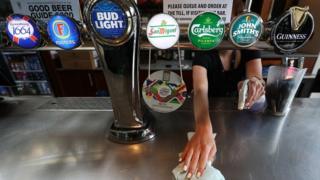Coronavirus: Drink-only pubs set to reopen next week
 Image copyright
PA Media
Image copyright
PA Media
Drink-only pubs in Northern Ireland are set to be allowed to open from Wednesday 23 September, BBC News NI understands.
It follows a meeting of the executive on Thursday afternoon.
The sector had been given an indicative reopening date of Monday 21 September.
It is understood the date has been moved back by two days to allow regulations around enforcement of the industry to be drawn up.
The reopening date had already been pushed back twice by executive ministers due to concerns about the virus.
About 600 pubs in Northern Ireland that do not serve food are still awaiting the green light to open.
At present, drink-only pubs can only serve customers outdoors.
The hospitality industry in Northern Ireland has argued for a tightening of restrictions and tougher enforcement against establishments that break the rules, to allow more law-abiding pubs to reopen.
Last week, representatives from the sector met executive ministers to call for regulations to be put in place, as opposed to guidance.
In the Republic of Ireland, drink-only pubs are due to reopen on the same date with the exception of Dublin, which remains under tighter restrictions due to a rise in cases.
Pam Cameron, deputy chair of Stormont's health committee, said drink-only pubs should be given permission to start trading again soon.
"The bulk of alcohol is actually consumed within the home and not in any establishment," the Democratic Unionist Party assembly member said.
"That's why I think it's most important that the restrictions do remain among homes and that advice on not mixing households remains because that is where your guard is down."
Stormont ministers have also been discussing the imposition of new localised restrictions across parts of Northern Ireland at Thursday's executive meeting.
On Wednesday, the restrictions were given legal force - but caused some confusion as new areas in the Lisburn and Castlereagh council area have been added to the list of affected areas.
Previously, it had been announced that the rules would only apply to the Belfast council area, Ballymena, BT28, BT29 and BT43.
The executive has maintained that postcodes will be added and removed as required, but DUP MP Gavin Robinson questioned whether it was the health minister who had chosen to place tighter restrictions on the area or if the decision had been taken at a full executive meeting.
Alliance assembly member Paula Bradshaw, who sits on Stormont's health committee, said it is vital that the public messaging regarding coronavirus is "crystal clear" and people are kept fully aware of any changes.
The new rules are expected to last for at least two weeks, and will be regularly reviewed by the executive.
On Thursday, the Department of Health in Northern Ireland reported no new coronavirus-linked deaths.
That means the death toll from the virus in Northern Ireland remains at 573.
The latest figures on the department's dashboard shows 149 new confirmed positive cases of the virus in the past 24 hours, bringing that total to 8,780.
The department's daily figures are mostly comprised of hospital deaths and where a patient had previously tested positive for the virus.
The Department of Health says the current R number - or reproduction rate - of coronavirus in Northern Ireland is estimated to be about 1.2.
The R value is the number of people who, on average, will be infected by a single person with coronavirus.
NI's chief scientific adviser said that the 14-day cases per 100,000 remains higher than the rest of the UK and the Republic, but testing is also higher in Northern Ireland.
"The current increase in cases in younger people is likely to lead to increasing cases in the over sixties with resulting pressure on the hospital system and, tragically, increasing deaths," said Prof Ian Young.
"It is obvious from these figures that we are still seeing an increase in Covid-19 across Northern Ireland and we must all play our part in trying to stem this tide, help protect ourselves and those around us, in particular the most vulnerable."